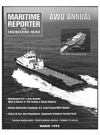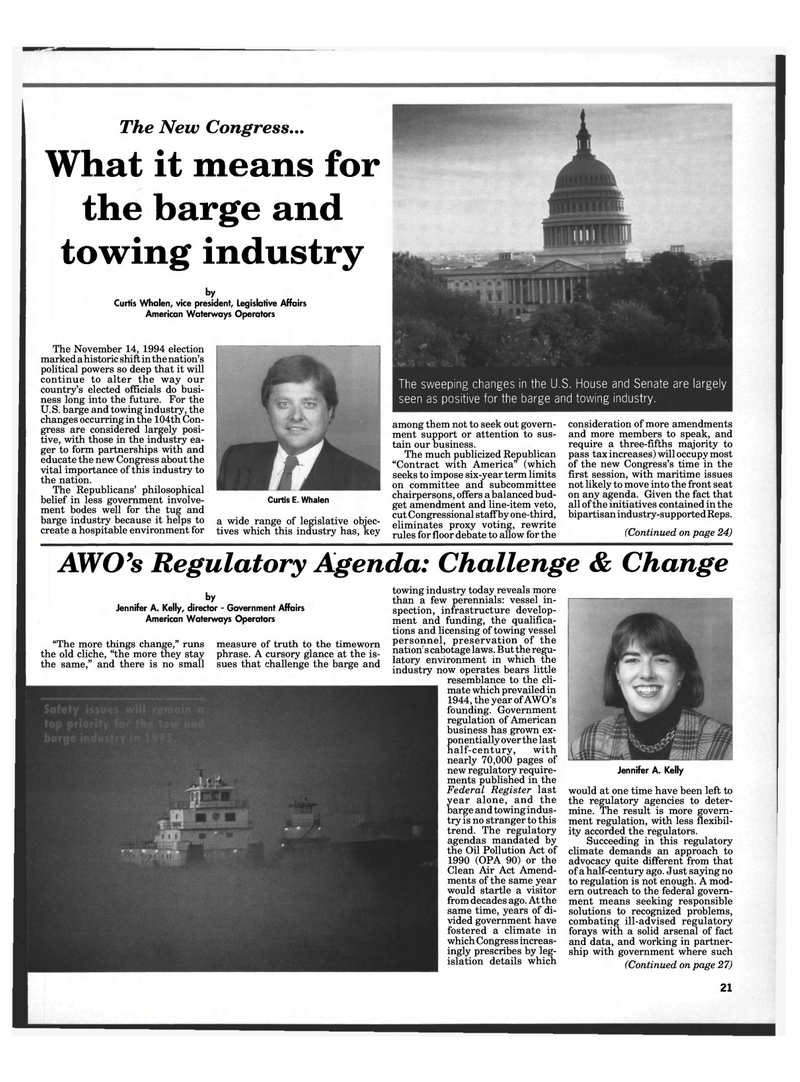
Page 19: of Maritime Reporter Magazine (March 1995)
Read this page in Pdf, Flash or Html5 edition of March 1995 Maritime Reporter Magazine
The sweeping changes in the U.S. House and Senate are largely seen as positive for the barge and towing industry.
The New Congress,..
What it means for the barge and towing industry b,
Curtis Whalen, vice president, Legislative Affairs
American Waterways Operators
The November 14, 1994 election marked a historic shift in the nation's political powers so deep that it will continue to alter the way our country's elected officials do busi- ness long into the future. For the
U.S. barge and towing industry, the changes occurring in the 104th Con- gress are considered largely posi- tive, with those in the industry ea- ger to form partnerships with and educate the new Congress about the vital importance of this industry to the nation.
The Republicans' philosophical belief in less government involve- ment bodes well for the tug and barge industry because it helps to create a hospitable environment for
Curtis E. Whalen a wide range of legislative objec- tives which this industry has, key among them not to seek out govern- ment support or attention to sus- tain our business.
The much publicized Republican "Contract with America" (which seeks to impose six-year term limits on committee and subcommittee chairpersons, offers a balanced bud- get amendment and line-item veto, cut Congressional staff by one-third, eliminates proxy voting, rewrite rules for floor debate to allow for the consideration of more amendments and more members to speak, and require a three-fifths majority to pass tax increases) will occupy most of the new Congress's time in the first session, with maritime issues not likely to move into the front seat on any agenda. Given the fact that all of the initiatives contained in the bipartisan industry-supported Reps. (Continued on page 24)
AWO's Regulatory Agenda: Challenge & Change by
Jennifer A. Kelly, director - Government Affairs
American Waterways Operators towing industry today reveals more than a few perennials: vessel in- spection, infrastructure develop- ment and funding, the qualifica- tions and licensing of towing vessel "The more things change," runs measure of truth to the timeworn personnel preservation of the the old cliche, "the more they stay phrase. A cursory glance at the is- ™tlon s cabotage laws. But the regu- the same," and there is no small sues that challenge the barge and !at°ry environment in which the ° industry now operates bears little resemblance to the cli- mate which prevailed in 1944, the year of AWO's founding. Government regulation of American business has grown ex- ponentially over the last half-century, with nearly 70,000 pages of new regulatory require- ments published in the
Federal Register last year alone, and the barge and towing indus- try is no stranger to this trend. The regulatory agendas mandated by the Oil Pollution Act of 1990 (OPA 90) or the
Clean Air Act Amend- ments of the same year would startle a visitor from decades ago. At the same time, years of di- vided government have fostered a climate in which Congress increas- ingly prescribes by leg- islation details which
Jennifer A. Kelly would at one time have been left to the regulatory agencies to deter- mine. The result is more govern- ment regulation, with less flexibil- ity accorded the regulators.
Succeeding in this regulatory climate demands an approach to advocacy quite different from that of a half-century ago. Just saying no to regulation is not enough. A mod- ern outreach to the federal govern- ment means seeking responsible solutions to recognized problems, combating ill-advised regulatory forays with a solid arsenal of fact and data, and working in partner- ship with government where such (Continued on page 27) 21

 18
18

 20
20
